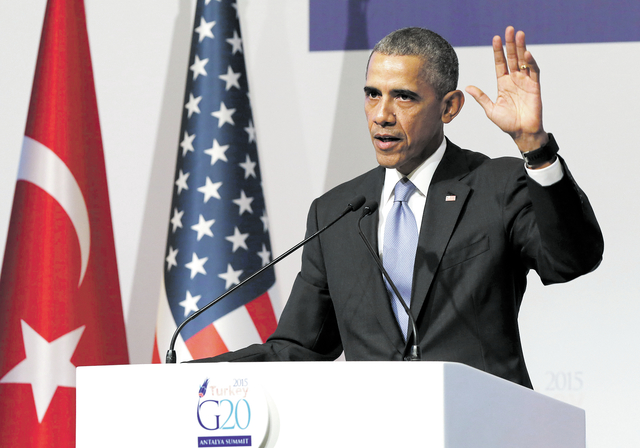Obama threatens to veto House GOP bill on Syrian refugees ADVERTISING Obama threatens to veto House GOP bill on Syrian refugees WASHINGTON (AP) — The White House threatened a presidential veto Wednesday of House Republicans legislation aimed at increasing screenings
Obama threatens to veto House GOP bill on Syrian refugees
WASHINGTON (AP) — The White House threatened a presidential veto Wednesday of House Republicans legislation aimed at increasing screenings for Syrian and Iraqi refugees before they enter the United States, calling new requirements in the bill “untenable.”
The legislation, which sets high hurdles for refugee admissions including FBI background checks and individual sign-offs by top federal officials, “would provide no meaningful additional security for the American people, instead serving only to create significant delays and obstacles in the fulfillment of a vital program that satisfies both humanitarian and national security objectives,” the White House said.
President Barack Obama would veto the legislation if it reaches his desk, the statement concluded.
Republican leaders, eager to respond quickly to Friday’s terror attacks in Paris, had described the bill as a middle ground approach. It institutes tough new screening requirements, but steers clear of demands from some Republicans, including presidential candidates, for religious questioning or a complete end to the U.S. refugee program.
“This is common sense. And it’s our obligation,” Speaker Paul Ryan of Wisconsin said on the House floor ahead of the veto threat. “If the intelligence and law-enforcement community cannot certify that a person presents no threat, then they should not be allowed in.”
Passport in Paris attacks fuels fears of Syrian refugees
WARSAW, Poland (AP) — After the bombs and Kalashnikov fire of the Paris attacks, a mere document — a passport — found near the body of an attacker is generating a new wave of dread throughout Europe and beyond. But whether the document ended up there by chance, or was part of an elaborate plot to sow panic, is not clear.
Regardless of the answer, the passport has played into the Islamic State group’s hands by raising concerns that militants may be marching alongside the thousands of asylum seekers flowing into Europe. That possibility is redefining the debate over immigration in Europe and even the United States, and prompting a backlash against Muslim refugees.
The far-right French leader Marine Le Pen called for an immediate end to the flow of migrants into France, while across the Atlantic about half of U.S. governors are taking steps to prevent absorbing Syrian refugees in their states, citing the passport.
“This terrorist attack will clearly change Europe’s refugee policies and how the arrivals in Europe are treated,” said Konrad Pedziwiatr, a sociologist and expert on Islam in Europe at the Krakow University of Economics.
“Already the open-door policy (in Germany and Sweden) of welcoming refugees was going to be reformed because the inflow is so significant that countries cannot cope with the numbers,” he said. “What the Paris attacks add to this difficult situation is the additional element of fear.”
With Islamic State targeted, what happens to Syria’s Assad?
DUBAI, United Arab Emirates (AP) — The tide of global rage against the Islamic State group lends greater urgency to ending the jihadis’ ability to operate at will from a base in war-torn Syria. That momentum could also force a reevaluation of what to do about President Bashar Assad and puts a renewed focus on the position of his key patrons, Russia and Iran.
The Syrian leader has lost much of the country to IS and other groups in the four-year war; half the population has been displaced, many areas have been leveled, and masses of refugees are flooding Europe. Along the way, Assad’s brutal military response has made him persona non grata in most of the world.
Portraying himself as the only viable alternative to jihadi rule, Assad has labeled all his enemies “terrorists” — a designation that, in the wake of the recent attacks on civilians by IS, may find greater resonance.
Cutting a deal with Assad would be the “lesser evil,” Spanish Foreign Minister Jose Manuel Garcia-Margallo said Wednesday.
“If we want peace, we have to find a way of getting along with Assad, at least in a transition period. … Roosevelt didn’t like Stalin, but he had to get a deal with him in order to defeat the Nazis, who were the greater evil,” Garcia-Margallo said.



